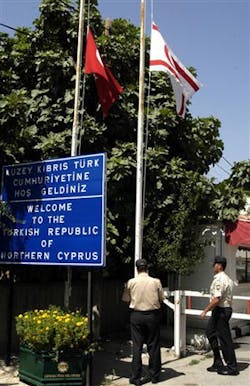Black Box of Crashed Cyprus Airliner Missing Recording Device
ATHENS, Greece (AP) -- Officials said Tuesday they had found only the exterior container of the cockpit voice recorder from a Cypriot airliner crash that killed 121 people, hampering investigative efforts into the accident's cause.
Autopsies on the bodies of 20 victims, including one flight attendant, showed they were alive when the plane went down, Athens coroner Nikos Kalogrias said Tuesday.
Kalogrias, one of a team of seven coroners, said the 20 victims' hearts and lungs were functioning when the plane crashed. ''The attendant was alive and died of injuries'' sustained in the crash, he said.
Coroners conducted the first six autopsies Monday. By early Tuesday afternoon they had nearly finished examining all 26 bodies identified by relatives, including that of co-pilot Pambos Haralambous, Kalogrias said.
Private Greek television channel Mega reported that the autopsy on Haralambous' body showed he too had been alive at the time of the crash. Coroners were not immediately available to confirm the report.
Athens' chief coroner Fillipos Koutsaftis said late Monday that, while victims had been alive at the time of crash, he could not rule out that they were unconscious when the Helios Airways Boeing 737-300, with six crew and 115 passengers, plunged 10,400 meters (34,000 feet) into a mountainous area near the village of Grammatiko, 25 miles (40 kilometers) north of Athens.
Pilots of two Greek F-16 fighter jets that intercepted the plane after it lost contact with Greek air traffic controllers had reported seeing the co-pilot slumped over the controls in the cockpit, apparently unconscious. There was no sign in the cockpit of the plane's German pilot, and his body was one of three not yet found.
A brush fire sparked by the crash burned through much of the debris scattered across two ravines and surrounding slopes, charring many bodies beyond recognition.
Akrivios Tsolakis, the head of the Greek airline safety committee, said the internal components of the plane's voice recorder were ejected from the container when the plane crashed.
''The only fortunate event in the investigation is that we have the flight data recorder,'' he said, adding that the box would be flown to Paris on Wednesday for decoding.
Tsolakis said a group of investigators would search for the rest of the voice recorder, and that American experts, including a representative of the plane's manufacturer, were providing assistance.
The voice recorder picks up any conversation inside the cockpit, but records only the last 30 minutes of sound. Because the airplane appeared to have been flying disabled for about three hours, it wasn't clear if the recording would be useful to investigators.
Tsolakis also confirmed that the bodies of the Cypriot co-pilot and a flight attendant were found next to the wreckage of the cockpit. ''They were found very close,'' he said, but would not comment further while the investigation was ongoing.
In Cyprus, police raided the offices of Helios Airways in the coastal city of Larnaca, near the international airport, late Monday, ''to secure ... documents and other evidence which could be useful for the investigation into possible criminal acts,'' Cyprus' deputy presidential spokesman Marios Karoyian said.
Investigators also were trying to determine why the pilot was not in his seat shortly before the crash.
The F-16 pilots said they saw two people possibly trying to take control of the plane; it was unclear if they were crew members or passengers.
The plane might have run out of fuel after flying for nearly three hours on autopilot, air force officials said, asking not to be named in line with Greek practice.
After the crash, authorities said it appeared to have been caused by a technical failure - resulting in high-altitude decompression. The airliner's pilots had reported air conditioning system problems to Cyprus air traffic control about a half-hour after takeoff, and Greek state TV quoted Cyprus' transport minister as saying the plane had decompression problems in the past.
But a Helios representative said the Boeing 737-300, manufactured in 1998 and operated by Deutsche BA until April 2004, had ''no problems and was serviced just last week.''
Searchers were still looking for three bodies, including the pilot, fire officials said. Cypriot authorities identified him as Marten Hans Jurgen, 50, from Berlin.
German daily Bild identified him as former East German airline pilot Hans-Juergen Merten, 58, and said he had been flying with Helios Airlines for six months but was employed by Direct Personnel International, a Dublin-based agency that supplies pilots to airlines.
Direct Personnel was ''working with the family'' of Merten, Managing Director Shane Pollard said, but declined to give further comment.
The German pilots' union Vereinigung Cockpit said it had no information on Merten or his background.
Helios General Manager Andreas Drakos said he could not recall exactly how long the pilot had worked for the airline.
A passenger list showed there had been 20 children under the age of 16 on board. At least 10 families with children were among the dead. The passengers and crew included at least 12 Greeks and the German pilot, and a four-member family of Armenian origin. The rest were Cypriot.
Copyright 2005 Associated Press
